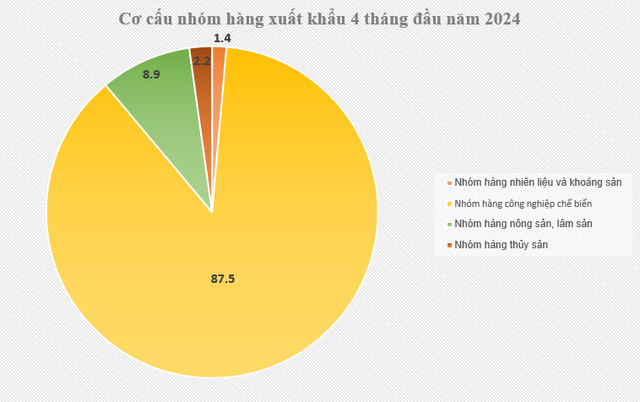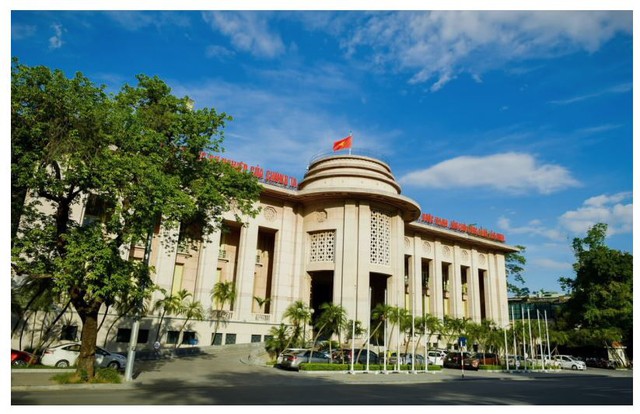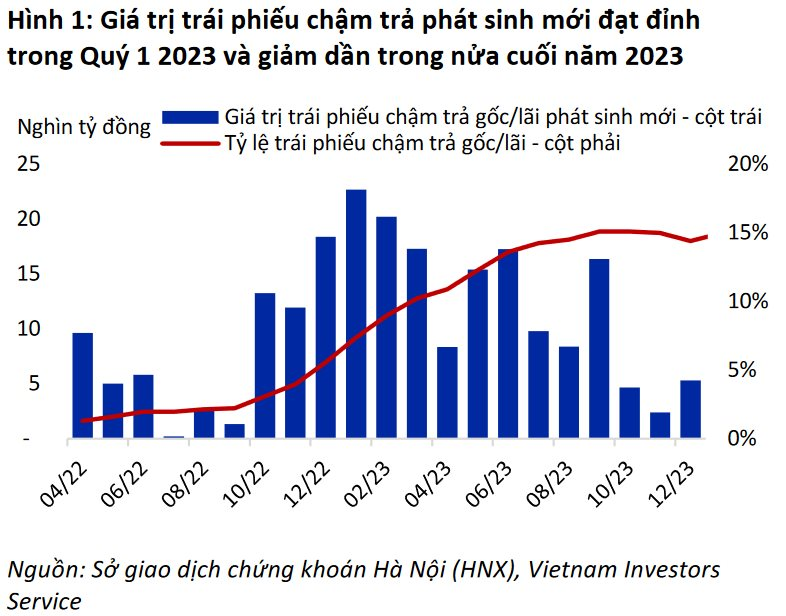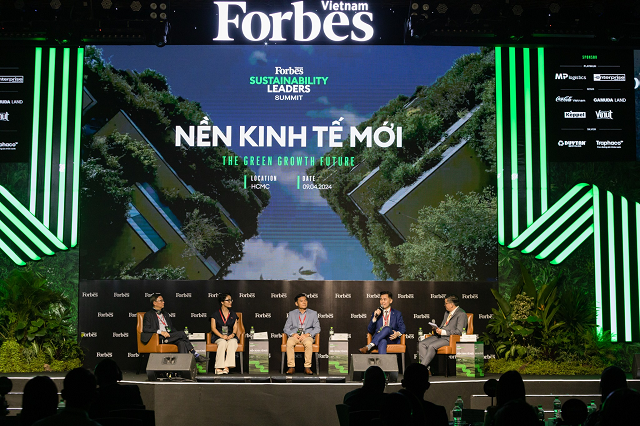
Speakers at the conference organized by Forbes Vietnam. Source: BTC
|
Preparing for more than a decade
The path of sustainable development has been implemented by enterprises for more than a decade. On 09/04, at the conference on the development of the new economy organized by Forbes Vietnam, Ms. Dao Thuy Ha – Deputy General Director of Business & Marketing of Traphaco Joint Stock Company (HOSE: TRA) said that the Company has spent more than 15 years to initiate a project to develop Vietnamese medicinal herbs, called GreenPlan.
Through the project, TRA together with scientists and localities, surveyed and evaluated medicinal herbs throughout the country, thereby forming a map of Vietnamese medicinal herbs and creating medicinal herb growing areas with farmers.
According to Ms. Ha, the concept of “clean medicinal herbs” according to the “Good agricultural and collection practices for medicinal plants” standard of the World Health Organization (GACP-WHO) is very familiar to the international community, but in Vietnam it is still quite new.
“If you have ever been to Sa Pa, you can see vast artichoke growing areas next to houses but meeting GACP standards. That is the model in which TRA cooperates with the H’mong ethnic minority farmers,” said Ms. Ha.
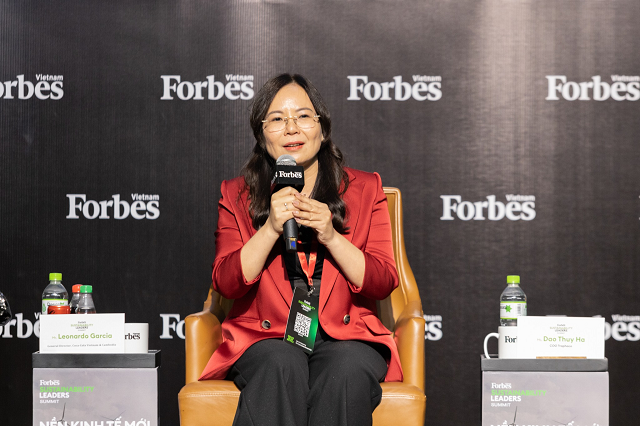
Ms. Dao Thuy Ha at the conference. Source: BTC
|
Accordingly, TRA provides seedlings and techniques for farmers to sow and commits to buying back the raw materials for production activities. Over the past 15 years, the Company has established 6 growing areas that meet GACP standards, ensuring the supply of raw materials.
However, the Deputy General Director of TRA believes that the more important issue in the project is the role of enterprises in connecting the community, stakeholders such as people, scientists to participate in the process of planting trees, and afforestation of bare hills. Through these activities, the Company also trains farmers and ethnic minorities in conservation harvesting techniques.
From the perspective of enterprises in the textile and garment industry, Mr. Tran Nhu Tung – Chairman of the Board of Directors of Thanh Cong Textile – Investment – Trading Joint Stock Company (HOSE: TCM) shared that in recent years, the requirements on environmental issues from customers are very large, especially in the European market, this is both a pressure and an opportunity for enterprises to move towards sustainable development.
TCM has had many programs, such as waste treatment, wastewater treatment, chemical management, reducing energy consumption, and changing fuels. For example, the company’s boilers are gradually switching to using biomass (such as rice husks) instead of coal. This material can be purchased from a lot of rice granaries in the Mekong Delta to reduce the amount of carbon because if the factory only needs to change 10%, it has reduced about 2.5 thousand tons of carbon, which is very significant.
Besides, the textile enterprise will reuse the discharged wastewater, that is, instead of treating the water and discharging it, TCM will circulate that amount of water, 30% – 40% depending on the design. Or in the selection of raw materials, of course, customers require selecting recycled ones. To save energy, the Company uses additional electricity from solar energy installed on the roof instead of using grid electricity from EVN.
In addition, every month, TCM updates the figures on the website so that customers or investors know that up to now, the Company has reduced the amount of carbon compared to before.
“Those are programs that are repeated every year so that customers, orders will come to us more. Because that is an inevitable trend that forces us to do so,” said Mr. Tung.
Enterprises in the financial sector are no exception
Speaking at the conference, Ms. Lien Pham – Head of Marketing and Sustainable Development Operations of Home Credit Vietnam said that enterprises like Home Credit do not directly generate a carbon footprint through producing products, but in any field of operation, they can generate a carbon footprint during operation. Realizing this, the Company has also made efforts to come up with different initiatives to minimize emissions through direct and indirect operations.
For direct, Home Credit digitizes and monitors operational activities in the Company. For example, completing the conversion of 100% of loan signing with customers on the Home App application, thereby reducing emissions from printed paper as well as employee travel, reducing large amounts of emissions. In addition, the Company building also has automatic temperature sensors to minimize consumption.
In terms of indirect, Home Credit provides loan products to many partners, such as preferential interest rate loan packages for customers of VinFast when buying electric motorbikes, electric bicycles or loan packages for customers to own used electrical appliances.
Last year, Home Credit also provided a 0% interest loan package for women who work as water hyacinth weaving in Bac Lieu province. This production expansion loan package has helped bring more water hyacinth weaving products to the market, which can reduce the use of plastic products.
“When we support those women, they also have the motivation to take charge of their lives and develop their businesses in a more sustainable way, while reducing the burden on the environment,” said the representative of the financial company.
 Ms. Lien Pham at the conference. Source: BTC
|
Balancing short-term and long-term is challenging
The Deputy Director of TRA said that pioneering in medicinal herb development is also a challenge for the enterprise when it comes to gaining the acceptance of shareholders as well as harmonizing short-term profits with long-term benefits.
“Although we have become the leading enterprise in oriental medicine, developing medicinal herb areas, it will also lead to confrontation when convincing consumers to change their habits because they have not accepted paying more for sustainably developed products,” Ms. Ha shared more.
Agreeing, the Home Credit representative also said that the biggest challenge is still the balance between short-term and long-term financial goals that sustainable development brings.
Ms. Lien Pham said that long-term values lie not only in economic growth, but also in improving people’s quality of life and the results achieved need to go hand in hand with minimizing the impact on the environment and other future values.
According to the leader representing the textile and garment industry, in the current difficult economic situation, enterprises must have revenue and expenses to pay salaries and develop sustainably, and environmental costs are often very high. Those are also barriers and difficulties for enterprises.
“Customers always require factories to be green, clean, and meet the standards of importers. That is a great pressure on textile and garment enterprises in general and Thanh Cong Textile in particular,” said Mr. Tung, sharing that in business, besides profit, enterprises must be responsible to the community and to the planet.
Most enterprises are aware of sustainable development, but the most difficult thing still lies in cost, because to implement projects related to the environment such as wastewater treatment, waste treatment, chemical management in the environment, all require very high costs and sometimes the profit of the enterprise is not enough to carry out that work.
Another point is that customers always require greener and cleaner products, but the price does not want to increase, so it will affect the profit margin of the enterprise, meaning that the cost is high but the selling price does not increase.
What can enterprises and stakeholders do?
According to Ms. Ha, enterprises themselves must have practical commitments and actions. In addition to the strategic views presented in the sustainable development report, enterprises must transform into a culture in each officer and employee, such as what has been done today to contribute to environmental protection or sustainable development.
Furthermore, the path of sustainable development also requires determination, perseverance, and pursuit, because to create a medicinal herb area like TRA, it is necessary










